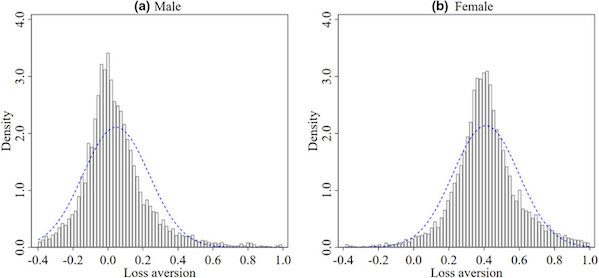Women feel the pain of losses more than men when faced with risky choices, according to new research
June 12, 2023
Source: drugdu
 591
591

Women are less willing to take risks than men because they are more sensitive to the pain of any losses they might incur than any gains they might make, new research from the University of Bath School of Management shows.
Published in the British Psychological Society's British Journal of Psychology, the study—"Gender differences in optimism, loss aversion and attitudes toward risk"—also finds that men are 'significantly' more optimistic than women, making them more willing to take risks.
Researcher Dr. Chris Dawson, associate professor in business economics at the University of Bath School of Management, said the findings were significant and could help explain sex-specific outcomes in different employment sectors, and in financial markets.
"It is widely acknowledged that men, across many domains, take more risks than women. These differences in how the sexes view risk can have significant effects," Dr. Dawson says.
"For instance, differences between the sexes in risk taking can explain why women are less likely to be entrepreneurs, are underrepresented in high-paying jobs and upper management, and less likely to invest their wealth in equities markets than men. Despite these important implications, we still know very little about why women take fewer risks than men."
"My research attempts to fill that gap. When thinking about risky choices, people tend to assess the probability of losing something alongside an evaluation of how painful that loss would be. I found that women take less risks than men as they focus more on the possibility of losing and anticipate experiencing more pain from potential losses," he adds.
Previous research suggests that women are more risk averse than men, and this study investigated the joint role of two psychological characteristics to explain the differences—loss aversion, the idea that losses loom larger than gains, and optimism.
To measure loss aversion, Dr. Dawson used data from 13,575 people from the UK British Household Panel Survey to assess how changes in household income from one year to the next predict changes in psychological well-being.
He found that income losses are less painful for men than for women with no difference in the psychological responses to income gains between the sexes.
When asked how they saw themselves financially a year from now with expectations about outcomes under the individual's control, men were significantly more optimistic than women.
The research indicates that this optimism may be linked to men's overconfidence about their abilities compared to women which previous studies have highlighted.
If women are both less optimistic about the probability of favorable outcomes occurring and less confident in their abilities than men, they will naturally evaluate a given gamble as being riskier, the research says.
Overall, the study finds that women report a lower willingness to take risks than men with 53 percent of this gap accounted for by the higher levels of loss aversion among women and a further 3 percent attributable to the lower levels of financial optimism among women.
Loss aversion and optimism still have significant effects on risk attitudes even after controlling for the personality traits such as openness, neuroticism and extraversion.
Provided by University of Bath
Read more on
- The first subject has been dosed in the Phase I clinical trial of Yuandong Bio’s EP-0210 monoclonal antibody injection. February 10, 2026
- Clinical trial of recombinant herpes zoster ZFA01 adjuvant vaccine (CHO cells) approved February 10, 2026
- Heyu Pharmaceuticals’ FGFR4 inhibitor ipagoglottinib has received Fast Track designation from the FDA for the treatment of advanced HCC patients with FGF19 overexpression who have been treated with ICIs and mTKIs. February 10, 2026
- Sanofi’s “Rilzabrutinib” has been recognized as a Breakthrough Therapy in the United States and an Orphan Drug in Japan, and has applied for marketing approval in China. February 10, 2026
- Domestically developed blockbuster ADC approved for new indication February 10, 2026
your submission has already been received.
OK
Subscribe
Please enter a valid Email address!
Submit
The most relevant industry news & insight will be sent to you every two weeks.



